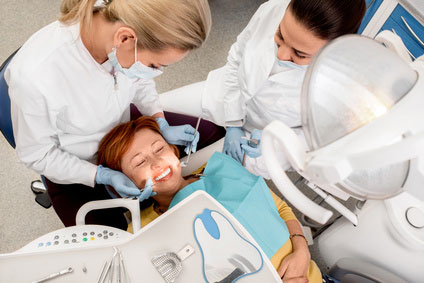Are you grinding your teeth at night?

Your teeth are made to bite, chew and grind. However, your teeth do have limits. With overuse, your teeth can start to hurt and become damaged. For most people, this is not a problem. However, for some people, damage occurs when they least expect it. This happens when teeth grinding becomes a nightly habit.
Understanding Teeth Grinding
Grinding your teeth at night can be deeply problematic. When you grind your teeth, you can start to inflict damage on the teeth and the surrounding jaw. These problems can be difficult to connect to grinding at first. After all, teeth grinding typically occurs at night when you are asleep. This habit is, therefore, unconscious and must be diagnosed through the cumulative impact on your teeth. In some cases, other people may be able to hear you grinding your teeth at night in order to streamline a diagnosis. Overall, this condition is known as bruxism. According to some estimates, it can affect up to 8 percent of the population.
Complications from Grinding Your Teeth
There are many reasons why grinding your teeth is a problem. First, grinding can lead to damage to the enamel. When the enamel is damaged, your teeth are more prone to discoloration and cavities. It can even make them more likely to break or chip. In fact, some people get a bruxism diagnosis after presenting with multiple chipped teeth. Beyond these overtly dental concerns, teeth grinding can also impact other parts of your jaw and head. Some people will experience a sore jaw from time to time after grinding their teeth. In some people, this develops into a chronic condition. The temporomandibular joint disorder is a condition wherein the muscles of your mouth and jaw become inflamed, causing pain. This pain can limit your ability to eat, speak, and more. Another symptom that can be surprising is a headache. People who grind their teeth at night are more likely to wake up with unexplained headaches in the morning. These symptoms may be noticed in isolation, or they may occur together. Be sure to mention any such symptoms when discussing the possibility of teeth grinding with your dentist.
Stop Grinding with Help from Mouth Guards
One of the most effective ways to stop grinding your teeth is with a mouthguard. Mouthguards are made to slip over the teeth while you sleep. This allows the mouth guard to protect the teeth and minimize the force of the jaws when they grind together. With a mouth guard in place, the teeth are better protected from damage. You are also likely to see an improvement in jaw and head symptoms. It is worth noting that a mouth guard does not stop the underlying cause of your teeth grinding. Rather, a mouth guard is an effective way to mitigate the symptoms of the condition.
Types of Mouth Guards
You have several options for mouth guards. There are some standard mouth guards that can be used immediately. These are purchased over the counter and require no setup or preparation. While these mouthguards are affordable, the lack of customization can actually make the painful symptoms worse in some cases. You can also purchase a mouth guard that you customize yourself. These mouth guards do not require a mold, but they actually conform to the shape of your teeth. However, for the best fit, consider a custom piece made by your dentist. Your dentist can create a mold of your mouth in order to create a mouth guard that is precisely customized for your teeth. This will provide the best fit for superior results.
Contact Your Dentist Today
If you are experiencing any symptoms of bruxism, then you need to talk to a dentist soon. At Olympic Dental, we can assess your teeth and determine the best solution. Contact Dr. Greg Got and the team at Olympic Dental to start addressing teeth grinding today.






